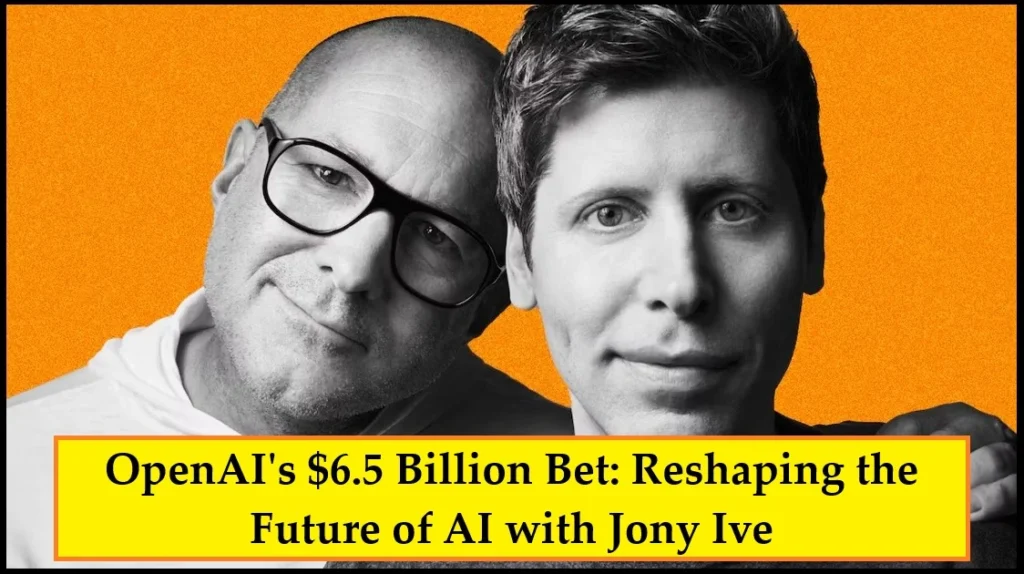OpenAI acquires Jony Ive’s startup for $6.5 billion, signaling a major push into AI hardware. Is this the biggest tech disruption since the iPhone? Explore the potential of OpenAI’s ambitious move and its implications for the future of AI.
OpenAI, Jony Ive, AI hardware, ChatGPT, acquisition
OpenAI’s $6.5 Billion Bet: Reshaping the Future of AI with Jony Ive
OpenAI, the company behind the revolutionary chatbot ChatGPT, has made a monumental $6.5 billion acquisition of Jony Ive’s design startup, io. This marks OpenAI’s largest acquisition to date, dwarfing its impending $3 billion purchase of Windsurf, and signals a bold move into the world of AI-powered hardware.

This strategic maneuver positions OpenAI to compete directly with tech giants like Microsoft, Google, Samsung, and even Apple in the hardware arena. Having cemented its position in generative AI with the widespread adoption of ChatGPT, OpenAI is now poised to redefine how we interact with artificial intelligence.
The Vision: Transcendentally Good AI
OpenAI CEO Sam Altman has hinted at a future where AI is deeply integrated into our lives, facilitated by purpose-built hardware. He’s acknowledged that current computing systems aren’t optimized for the demands of a world increasingly reliant on AI, echoing sentiments expressed by Google CEO Sundar Pichai.
Altman envisions devices that move beyond the traditional screen-and-keyboard paradigm, offering new ways to interact with both software and hardware. He suggests these devices will require a significant shift in user behavior, demanding a high level of trust in AI’s ability to understand and act in our best interests. This raises intriguing questions about the ethical implications and potential societal impact of such deeply integrated AI.
Jony Ive’s Design Expertise: A Key Ingredient
The acquisition brings Jony Ive, the former Apple design chief renowned for his work on iconic products like the iPhone and iPad, into the OpenAI fold. Ive and his team, comprised largely of former Apple designers, will play a crucial role in shaping the design and functionality of OpenAI’s future hardware offerings.
Reports suggest that OpenAI and Ive’s LoveFrom design studio have already been collaborating for two years, developing prototypes for headphones and camera devices. Ive has expressed enthusiasm about the initial product of their partnership, hinting at the potential for groundbreaking innovation.
The Potential for Disruption
The convergence of OpenAI’s cutting-edge AI models with Jony Ive’s design prowess has the potential to be truly disruptive. Could this partnership lead to the biggest tech revolution since the iPhone? While details about the specific hardware being developed remain scarce, Altman’s comments suggest a focus on intuitive and seamless integration of AI into our daily lives.
Imagine AI-powered devices that anticipate our needs, personalize our experiences, and augment our capabilities in ways we can only begin to imagine. The possibilities are vast, ranging from personalized learning tools and advanced healthcare devices to revolutionary communication platforms and immersive entertainment experiences.
Challenges and Concerns
While the potential benefits are immense, the development of such advanced AI hardware also presents significant challenges. Ensuring user privacy, addressing ethical concerns, and building trust in these powerful technologies will be crucial for widespread adoption.
The level of integration envisioned by Altman raises questions about data security, algorithmic bias, and the potential for misuse. OpenAI will need to address these concerns proactively to build public confidence and ensure responsible development of this transformative technology.
The Future of AI Hardware
OpenAI’s $6.5 billion investment in AI hardware is a clear indication of the company’s ambitious vision for the future of artificial intelligence. The partnership with Jony Ive adds a layer of design expertise that could propel OpenAI to the forefront of this emerging field.
Whether this venture will lead to the next iPhone-level disruption remains to be seen. However, one thing is certain: OpenAI’s bold move has set the stage for a new era of AI-powered devices, with the potential to reshape our world in profound ways.















